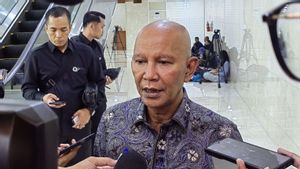
JAKARTA - Several military institutions, artificial intelligence research centers run by the Chinese government, and universities in China have purchased a small number of Nvidia semiconductors that have been banned from being exported by the US in the past year, according to a review of the tender documents by Reuters.
Sales by the largely unknown Chinese supplier highlight the difficulties Washington faces, despite the ban, to completely cut off China's access to advanced US chips that could trigger breakthroughs in artificial intelligence and advanced computers for military purposes.
Buying or selling high-end US chips has not violated the law in China, and publicly available tender documents show dozens of Chinese entities have purchased and received Nvidia semiconductors since restrictions were imposed.
The purchases include A100 chips and H100 stronger chips - exported to China and Hong Kong were banned in September 2022 - as well as slower A800 and H800 chips Nvidia developed for the Chinese market but were also banned in October last year.
The graphics processing unit (GPU) created by Nvidia is considered far superior to artificial intelligence work compared to competing products as it can process large amounts of data required for machine learning tasks.
Demand and continued access to the banned Nvidia chip also showed a lack of good alternatives for Chinese companies, despite the development of competing products from Huawei and others. Prior to the ban, Nvidia dominated 90% of the Chinese-made intelligence chip market share.
Buyers include elite universities and two entities subject to US export restrictions - Harbin Institute of Technology and Chinese University of Electronic Science and Technology, which are accused of involvement in military affairs or affiliated with military agencies against US national interests.
In May, the Harbin Institute of Technology purchased six A100 Nvidia chips to train an in-depth learning model. Meanwhile, the Chinese University of Science and Electronic Technology purchased an A100 in December 2022. The goal was not identified.
Nvidia or retailers approved by the company are not among identified suppliers. It is unclear how these suppliers acquired their Nvidia chips.
However, following US restrictions, the black market for such chips has emerged in China. Chinese suppliers have previously said that they purchased excess stocks found in the market after Nvidia shipped large quantities to large companies in the US, or imported through locally registered companies in places such as India, Taiwan, and Singapore.
Nvidia said that the company complies with all applicable export control laws and asks customers to do the same.
"If we know that customers have made illegal sales to third parties, we will take immediate and appropriate action," the company's spokesman said.
The US Department of Commerce declined to comment. US authorities have pledged to close gaps in export restrictions and have sought to limit access to chips by Chinese companies located outside China.
Chris Miller, professor at Tufts University and author of "Chip War: The Fight for the World's Most Critical Technology", said it was unrealistic to think US export restrictions could be completely closed tight given the chip is small and can be easily smuggled.
The main goal is to "obstacle the development of Chinese artificial intelligence" by making it difficult to build large clusters of advanced chips capable of training artificial intelligence systems, he added.
The review covers more than 100 tenders where government entities have acquired A100 chips and dozens of tenders since the October ban showed purchases of the A800 chip.
Tender published last month also showed that Tsinghua University acquired two H100 chips, while a laboratory run by the Ministry of Industry and Chinese Informatics acquired one.
Buyers including an unnamed entity from the People's Liberation Army based in the city of Wuxi, Jiangsu province, according to tenders from the military database. The entity searched for 3 A100 chips in October and one H100 chip this month.
Military tenders in China are often very much encouraged, and Reuters cannot find out who won the offer or the reason for the purchase.
관련 항목:
Most tenders show that chips are used for artificial intelligence. However, most purchases are made in very small amounts, far from what is needed to build large artificial intelligence language models from scratch.
For example, Shandong's Artificial Intelligence Institute awarded Shandong a contract worth 290,000 yuan (IDR 629.2 million) for 5 A100 chips to Shandong Chengxiang Electronic Technology last month.
Many tenders stipulate that suppliers must provide and install products before accepting payments. Most universities also published notifications showing that the transaction was complete.
The University of Tsinghua, dubbed China's Massachusetts Institute of Technology, is a highly prolific tender publisher and has purchased around 80 A100 chips since the 2022 ban. In December, Chongqing University published a tender for one A100 chip explicitly stating that the chip should not be used or outlined but must be a "new brand". Delivery was completed this month, according to notice.
The English, Chinese, Japanese, Arabic, and French versions are automatically generated by the AI. So there may still be inaccuracies in translating, please always see Indonesian as our main language. (system supported by DigitalSiber.id)












